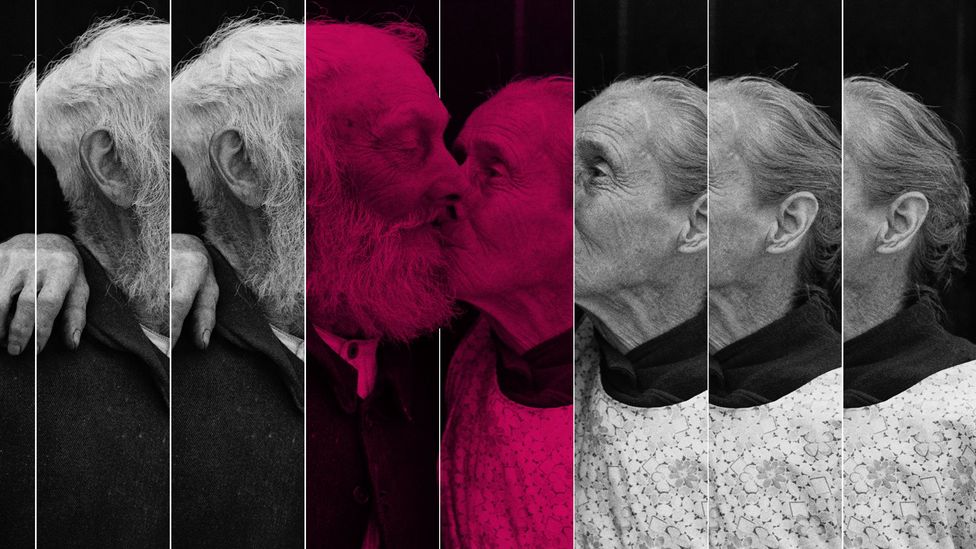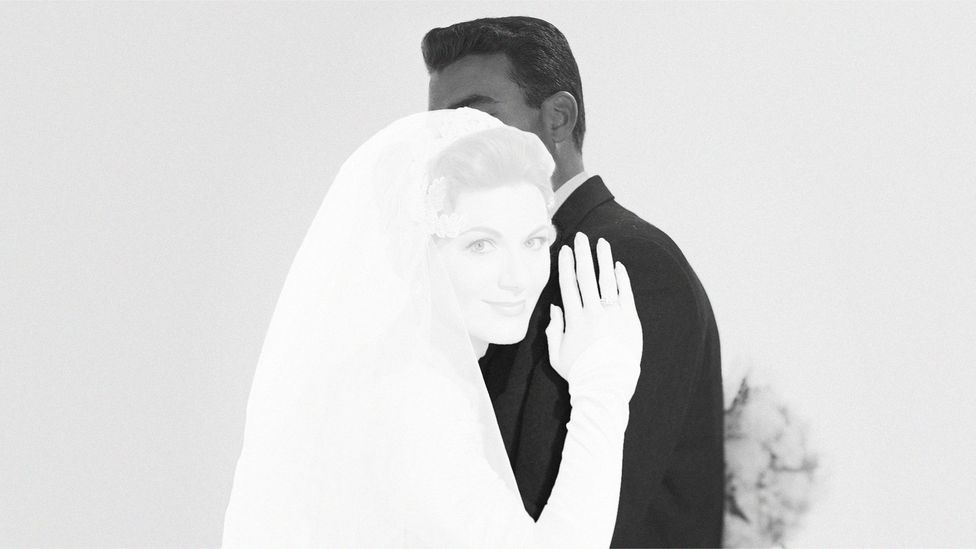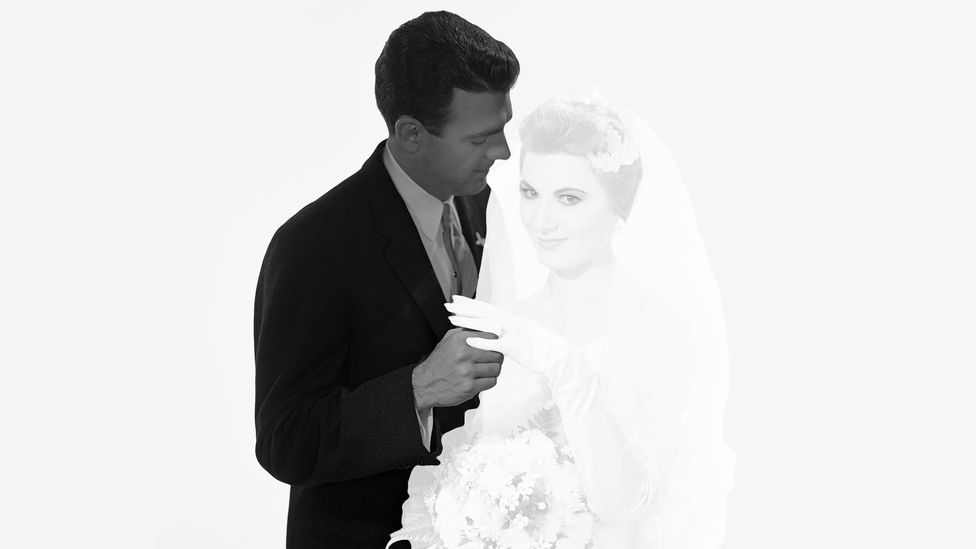Love Old Fashion Way Isn't Always the Right Way
Old-fashioned romantics might have the wrong thought near beloved. Strong behavior in true love could exist blinding yous to both the good and bad in your partner, with sometimes toxic results.
H
Have you ever explained bug you have with your partner to your friends, only for them to call up they are not worth worrying about? Or accept yous seen a friend commencement a new romance with someone you lot call back is completely unsuitable but they seem to go from strength to strength?
Psychologists have found two scales that influence how nosotros outset and maintain relationships.
Ane measures how much importance we put onto beginning impressions and early signs of compatibility, while the other measures how probable nosotros are to work through bug in relationships. They are chosen implicit theories of relationships (because we don't frequently talk about them). We might intuitively think of ourselves as more or less likely to believe in true honey – only this is not something that we openly discuss with others or are conscious of when nosotros start new relationships.
Together, these two scales can tell united states of america if we are more likely to avoid talking about bug with our partners, look for faults where they might not exist, and 'ghost' our fashion out of relationships. Differences in these implicit attitudes can also help united states of america sympathise the reasons that others' romantic choices often seem inexplicable to united states of america.

Do you believe in love at first sight? Or does it grow over time? (Credit: Getty Images)
To find out how you score, take the two quizzes below.
The Soul Mate calibration
Answer the following questions on a scale of 1 to seven, where ane is strongly disagree and vii is strongly agree.
i. Success in a romantic relationship is based generally on whether the people are "right" for each other.
two. There is a person out there who is perfect (or close to perfect) for me.
3. In marriages, many people discover (vs. build) a deep intimate connection to their spouse.
4. It is extremely important that my spouse and I be passionately in love with each other after we are married.
5. I couldn't marry someone unless I was passionately in dearest with him or her.
vi. In that location is no such thing every bit "Mr. Right" or "Ms. Correct".
7. I expect my futurity hubby or wife to be the most amazing person I accept ever met.
8. People who are searching for a perfect lucifer are wasting their fourth dimension.
9. The reason most marriages neglect is that people aren't right for each other.
ten. Bonds between people are usually there before yous run across them.
Now for scoring. First add your answers for 1, 2, 3, four, 5, seven, ix and x. For questions vi and viii, you need to subtract each answer from the number viii and apply the new number as your respond for that question. For example, if you answered "6", add a 2 to your total. One time you take your final total, divide by 10 to get your average for this scale.
The Work-it-out scale
Answer the post-obit questions on a scale of 1 to seven, where ane is strongly disagree and 7 is strongly concur.
ane. Success in a romantic relationship is based generally on how much people attempt to make the relationship piece of work.
2. In marriage, effort is more than important than compatibility.
3. In a relationship, love grows (vs. love is found).
4. If people would simply put in the effort, virtually marriages would piece of work.
5. I could be happily married to most people, if they were reasonable.
6. The reason well-nigh marriages fail is that people don't put in the try.
7. How well you know someone depends on how long y'all have known him or her.
8. If I were to marry a random person, I would be satisfied.
9. Only over time can you actually acquire about your partner.
To find out your score, add your answers and divide by 9.
The questions in this quiz are taken from the Relationship Theories Questionnaire used past Renae Franiuk, of Aurora University, Illinois, in her research into implicit theories and human relationship satisfaction and longevity. Franiuk uses 'Soulmate' and 'Piece of work-it-out' to depict the ii scales. Other researchers apply 'destiny' and 'growth' to draw similar scales.

When relationships are struggling, people who score more highly on the 'growth' scales cope best (Credit: Getty Images)

When they realise that someone isn't their soul-mate, "destiny" believers may carelessness the relationship and "ghost" their partner (Credit: Getty Images)

People with "destiny" behavior about love tend not to hash out their relationship issues, which can lead to growing resentments (Credit: Getty Images)
If they don't interruption upwardly over an consequence – and still believe that they've found their true dearest – the destiny believer may only overlook the issue altogether. "Destiny believers tend to be more than forgiving of a partner and more likely to avert a fight because they want to believe that this person is their soulmate," says Franiuk. That could exist positive for minor disagreements. "But if you're fugitive big conflict you terminate up staying with someone who is not good for you."
And the consequences can be extremely serious. Destiny believers who take been together for longer are more probable to overlook issues, fooling themselves into thinking they are a meliorate match because of the amount of time they take been together.
"We found that the longer destiny theorists stayed in relationships with someone who is not the right person, the more they reported violence," says Franiuk. "They downplay problematic relationships. They might give someone a longer chance than other people might. Some might meet warning signs early and end the relationships, just there will be some who don't believe they are in a human relationship with the correct person only for economic reasons they remain and their personality traits brand them more forgiving, which puts them in dangerous situations."
It would seem that romantic behavior remain fixed over time. So, once a destiny believer, always a destiny laic. "These theories are deeply held. In one case people hit their 20s and 30s personalities are pretty stable. Like personality, relationship building is developed at an early age – children grade these ideas based on the relationships around them," says Franiuk.

The "growth" beliefs nigh relationships tend to lead to better communication and greater long-term satisfaction. Problems can even make the couple stronger (Credit: Getty Images)
The two implicit theories do non demand to exist mutually exclusive, though. "You can have beliefs that relationships improve when couples piece of work on them together, but [notwithstanding believe] at that place is all the same the 'correct' person out there for y'all," says Freedman. "There are not going to be many people that think that no growth is possible. And we can still alter the ways we express those beliefs. Nosotros would expect that past experiences volition shape how nosotros approach new relationships." So just because you lot believe in romantic destiny, you might end the relationships in a more compassionate way, rather than ghosting, or you might make a more witting effort to work through bug rather than overlooking them.
They say the form of true love never did run smooth – but a greater awareness of our own romantic tendencies might merely help us navigate those bumps and turns along the manner.
--
William Park is @williamhpark on Twitter. Javier Hirschfeld created the artwork for this article.
Join 900,000+ Future fans by liking us on Facebook , or follow u.s.a. on Twitter or Instagram .
If you liked this story, sign up for the weekly bbc.com features newsletter , chosen "If You Just Read 6 Things This Week". A handpicked selection of stories from BBC Future, Civilization, Capital, and Travel, delivered to your inbox every Friday.
0 Response to "Love Old Fashion Way Isn't Always the Right Way"
Post a Comment